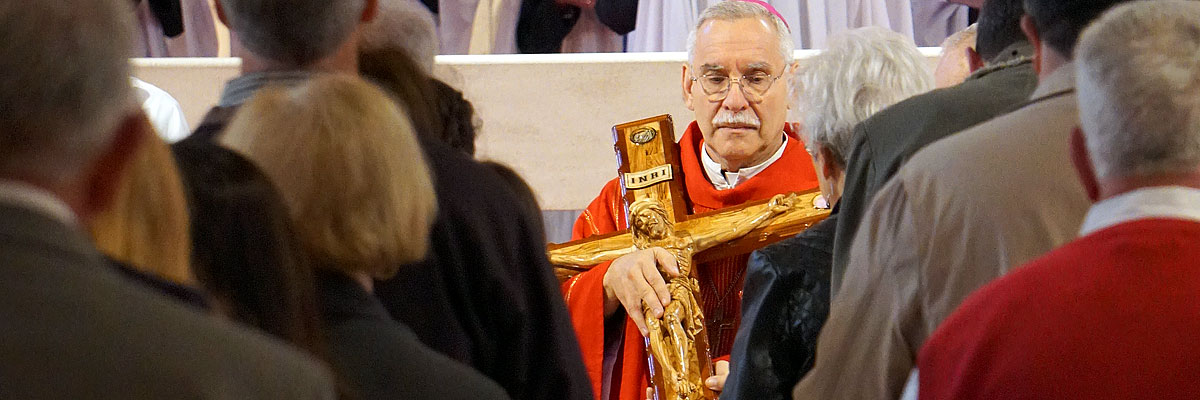Official Website of the
Catholic Diocese of Little Rock
Archdiocese of Oklahoma City Red Mass
Published: October 31, 2015
Bishop Anthony B. Taylor preached the following homily at the Cathedral of Our Lady of Perpetual Help in Oklahoma City on Saturday, Oct. 31, 2015.

Bishop Taylor
Every year we celebrate this Mass to ask God to guide judges, attorneys, law school professors, students and public servants in the exercise of your duties in the light of God's higher law, apart from which there is no true justice. The reason we call this a "Red Mass" is that in this Mass we invoke the Holy Spirit — whose liturgical color is red — asking the Holy Spirit to guide you in all you do in your difficult but invaluable service to all of us.
Last month I was in
Pope Francis' address to a joint session of Congress was a proud moment for me as a Catholic and as an American. In his talk Pope Francis reminded our legislators — and all of us — of our call "to defend and preserve the dignity of our fellow citizens in the tireless and demanding pursuit of the common good, for this is the chief aim of all politics."
We owe you a tremendous debt for your faithful service and we pray that the Holy Spirit will give you the wisdom of Solomon as you seek to exercise your profession in a way truly worthy of the Lord.
Then he held up for us the figure of Moses as a good synthesis of this work, in two ways: 1.) as the "lawgiver of the people of Israel, he symbolizes the need of people to keep alive their sense of unity by means of just legislation," on the other hand 2.) as patriarch Moses "leads us directly to God and thus to the transcendent dignity of the human being." Taken together this reminds us that we "are asked to protect, by means of the law, the image and likeness fashioned by God on every human face."
Pope Francis then unpacked for us what this means for us today through the witness of four great Americans: Abraham Lincoln, Dr. Martin Luther King, Jr., Dorothy Day and Thomas Merton. He said: "A nation can be considered great when it defends liberty as Lincoln did, when it fosters a culture which enables people to 'dream' of full rights for their brothers and sisters, as Martin Luther King sought to do; when it strives for justice and the cause of the oppressed, as Dorothy Day did by her tireless work, the fruit of a faith which becomes dialogue and sows peace in the contemplative style of Thomas Merton."
The day before bringing this message to Congress, Pope Francis celebrated the Mass of canonization of Father Junípero Serra, at which I was present. All of the saints give witness to the universal call to holiness, which was the foundation for all of Pope Francis' 18 talks while in our country and which brought many of us to tears, not just Speaker of the House John Boehner.
Jesus speaks about this in the Beatitudes of which we are quite familiar and which just happens to be the Gospel for today's Red Mass since this year it falls on All Saints' Day. And for that reason, today I would draw your attention especially to the Fourth Beatitude, which is especially à propos. Your profession and Jesus' call to holiness come together in this Beatitude: “Blessed are they who hunger and thirst for ... δικαοσυνη ... this is a notoriously difficult word to interpret, broader in meaning than any of the English words available to translators.
In the Gospel you just heard it is rendered as "righteousness," but Jesus doesn't mean this to be taken in a narrow sense of merely being more virtuous than others. More often it is rendered "justice," which is actually closest to the Greek, but this should not be taken in a narrow, merely juridical sense. Sometimes it is rendered "holiness," but this should not be taken in a narrow, merely pious sense. In context it means something more along the line of "doing things the way God would want" — which of course includes righteousness, justice and holiness. So, "Blessed are they who hunger and thirst to do things as God would want, they shall have their fill.”
Let's look at this a little more closely: Hunger and thirst. The average person 2,000 years ago was never far from physical hunger: They lacked food security. They couldn't simply turn the faucet to have water flow right into the house. They had to walk to a well and bring back water in heavy jugs. Most people in Jesus’ audience had experienced desperate hunger and thirst at some time in their life, so when they heard this beatitude, they knew Jesus was using their experience of a life or death situation — the risk of death by starvation or dehydration — to talk about a very serious matter: living our lives as God would want.
By speaking this way, Jesus is challenging his hearers to ask ourselves how much we really want to do God's will in all things, including in the way you exercise the legal profession — as much as a person dying of hunger and thirst wants to eat and drink? As much as Abraham Lincoln wanted liberty and unity? As much as Martin Luther King dreamed of equality and inclusion? As much as Dorothy Day wanted justice for the oppressed? As much as Thomas Merton wanted dialogue and peace?
Most of us want to live good lives, but we generally desire holiness in only a rather vague or general way ... so when difficult situations occur, we are sometimes not prepared to make the sacrifices that doing the right thing demands, especially when they know some people will not like the results. That is why I have to remind myself — and you — that the only one we really have to please is the Lord ... and sometimes this means embracing the cross, especially when what the Lord requires is unpopular or easily misconstrued.
Look at the sorry state of the world around us. Perhaps some of the situations you have to deal with frequently in the legal profession. Genuine holiness is one of the greatest needs of our time! If you and I long to live a life founded solidly on faithfulness to the Word of God as intensely as a starving person longs to eat, Jesus promises us that our desire will be fulfilled. He also reminds us that it will include embracing the cross.
And notice this challenging detail: Who were Jesus' main adversaries? Not people who had messed up their lives. Sad to say, Jesus' main adversaries belonged to the legal profession — in their case, religious law. That's why we have this Red Mass to ask the Holy Spirit to guide you in all that you do.
The Scribes were minimalists. Some of them were experts in finding loopholes in laws that conflicted with their own self-interest. The Pharisees were maximalists. Some of them applied the law too strictly, without sufficient regard for the broken human condition. But Jesus challenges both of these groups of people to move beyond the strict letter of the law to its prudent application in particular cases, in the light of that higher law before which all other laws must give way.
To do this, you have to live for something bigger than yourself, and see things from a bigger perspective. You have to hunger and thirst to always do the right thing as intensely as a starving person longs to eat and drink. Isn't it true that many of the people you deal with are starving for a life with a solid foundation and don't even know it?
Or that to be solid, the foundation has to be characterized by living as God would want? That's why their lives are such a mess. Your profession is both difficult and crucial for our well-being. We owe you a tremendous debt for your faithful service and we pray that the Holy Spirit will give you the wisdom of Solomon as you seek to exercise your profession in a way truly worthy of the Lord!
After visiting
He reminded us that our "Declaration of
And you in the legal profession are on the front lines of this ongoing work of promoting justice with a human heart — truth rooted in mercy — and of course defending human life, human dignity and human rights at all stages of existence, especially when to do so requires courage, wisdom and all the other gifts of the Holy Spirit which we pray for today. May God bless you in the vital service you provide to us and may the Lord continue to bless us through you!









